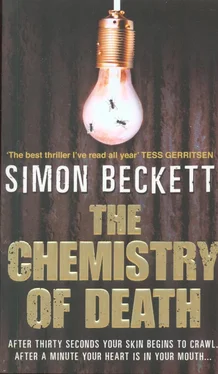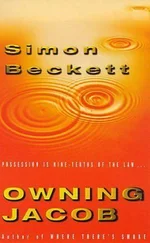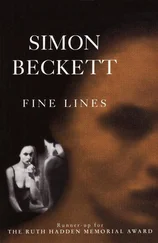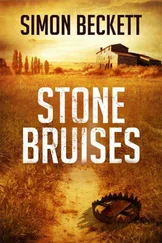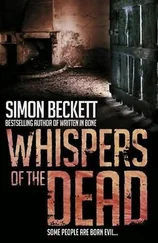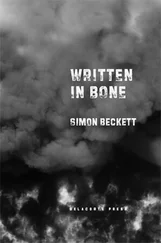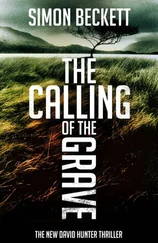Simon Beckett - The Chemistry of Death
Здесь есть возможность читать онлайн «Simon Beckett - The Chemistry of Death» весь текст электронной книги совершенно бесплатно (целиком полную версию без сокращений). В некоторых случаях можно слушать аудио, скачать через торрент в формате fb2 и присутствует краткое содержание. Жанр: Триллер, на английском языке. Описание произведения, (предисловие) а так же отзывы посетителей доступны на портале библиотеки ЛибКат.
- Название:The Chemistry of Death
- Автор:
- Жанр:
- Год:неизвестен
- ISBN:нет данных
- Рейтинг книги:5 / 5. Голосов: 1
-
Избранное:Добавить в избранное
- Отзывы:
-
Ваша оценка:
- 100
- 1
- 2
- 3
- 4
- 5
The Chemistry of Death: краткое содержание, описание и аннотация
Предлагаем к чтению аннотацию, описание, краткое содержание или предисловие (зависит от того, что написал сам автор книги «The Chemistry of Death»). Если вы не нашли необходимую информацию о книге — напишите в комментариях, мы постараемся отыскать её.
The Chemistry of Death — читать онлайн бесплатно полную книгу (весь текст) целиком
Ниже представлен текст книги, разбитый по страницам. Система сохранения места последней прочитанной страницы, позволяет с удобством читать онлайн бесплатно книгу «The Chemistry of Death», без необходимости каждый раз заново искать на чём Вы остановились. Поставьте закладку, и сможете в любой момент перейти на страницу, на которой закончили чтение.
Интервал:
Закладка:
Then, out of the confusion, I heard the words that almost stopped my own heart.
'It's no good. We're too late.'
Epilogue
The grass cracked underfoot like broken glass. The early-morning frost bleached the colour from the landscape, turning it into a monochrome wilderness. A lone crow wheeled across the white sky, its wings motionless as it skated across the cold air. It beat them once, twice, then disappeared among the skeletal limbs of a tree; one more black shape among the tangle of bare branches.
I pushed my gloved hands further into my pockets, stamping my feet as the cold seeped through the soles of my boots. In the far distance, reduced to little more than a speck of colour, a car was heading away on a winding, hair-thin ribbon of road. I watched it go, envying the driver's journey towards the warmth of life and houses.
My hand went to rub the white line on my forehead. The cold was making it ache. Its sensitivity was a lingering reminder of the night I'd gashed it on the doorframe of the Land Rover. In the months since then the wound had healed to leave only a thin scar. It was the less visible scars that made then-presence more keenly felt. But I knew that even those would eventually scab over and heal.
Given time.
Even now it was difficult to look back on what had happened in Manham with any degree of objectivity. Flashbacks to that night of the storm, of descending into the cellar, driving Jenny through the rain, and of what followed, came with less frequency now. But they still left me winded by their impact when they did.
Mason had still been alive when the police found him. He survived for three more days, regaining consciousness only long enough to smile at the policewoman guarding his hospital bed. For a while I'd been concerned that there might be charges, English law being what it is. But the obviating circumstances of self-defence, coupled with the grim evidence of the cellar itself, had been enough to brush aside the greyer areas of legality.
If any more evidence was needed, it was supplied by the journal the police found at the back of a locked drawer in Henry's desk. It contained a detailed account of his patronage of Manham's gardener, an unofficial case study that amounted to a posthumous confession. His fascination with his subject was all too apparent, from Mason's early sadism – as an adolescent he had been responsible for the cat mutilations Mackenzie had told me about – to their final twisted partnership.
I hadn't read it myself, and didn't want to, but I'd spoken to one of the police psychologists who had. He'd failed to hide his excitement over what was, after all, a unique glimpse into not one but two damaged psyches. It was, he told me, the stuff professional reputations were made from.
As a frustrated psychologist himself, I thought Henry would appreciate the irony.
About my partner himself, my feelings were still unresolved. There was anger, certainly, but also sadness. Not so much for his death as the waste of his life, and all the other lives he'd also caused to be wasted. It was still difficult to reconcile the man I'd regarded as my friend with the bitter creature who'd revealed himself at the end. Or to know which of them was the true Henry.
The fact was my friend had tried to kill me, yet at times I wondered if the truth was more complex. The post-mortem had revealed he'd died not from his injuries, although they would probably have proved fatal by themselves. He'd been killed by a massive overdose of diamorphine. The syringe he'd had in his pocket had been empty, the needle embedded in his flesh. It could have been accidental, a fluke caused when the Land Rover had run him down. Or, as he lay in agony afterwards, he might have injected himself deliberately.
But that still didn't explain why he hadn't given me a lethal dose in the first place. It would have been a far easier way of staging my suicide, and certainly far more effective.
It was only at the inquest that I found out something that made me question how committed he had really been. When the police examined the Land Rover, one end of the rubber pipe was still jutting through the window. But instead of being connected to the exhaust, the other was simply trailing on the floor.
It might have come off when the car started moving. It might have snagged loose on Henry's body as the wheels went over him. But I couldn't help but wonder if it had ever been fixed to the exhaust in the first place.
It was asking too much to believe Henry had planned it to happen as it did, but I liked to think he might have had second thoughts. If he'd truly wanted to kill me he'd had ample opportunity. And I kept coming back to how he made no attempt to move out of the way of the Land Rover. Exhaustion, perhaps; his weakened legs unable to react in time. Or perhaps as he saw the car bear down on him he simply made a decision. By his own admission he lacked the courage to take his own life. Perhaps at the end he simply chose the easiest route, and let me do it for him.
But that might be reading too much into it, bestowing on him a benefit of the doubt he doesn't deserve. Unlike Henry, I don't claim any insights into human psychology. That remains a far murkier field than mine, and no matter how much I want to believe some redeeming spark existed in him, there's no way of knowing for sure.
As with so many other things.
I'd had quite a few visitors after I'd been discharged from hospital, some calling out of duty, some curiosity, a few out of genuine concern. Ben Anders was one of the first, bringing with him a fine old malt whisky.
'I know grapes are traditional, but I thought grain would do you a damn sight more good,' he'd said as he opened it.
He'd poured us both a glass, and as I'd raised mine slightly in answer to his silent toast, I almost asked him if the older woman he'd had an affair with all those years ago had been a doctor's wife. But I didn't. It was none of my business. And when it came down to it I didn't really want to know.
A more surprising visitor was the Reverend Scarsdale. It had been an awkward visit. The old differences still remained, and neither of us had much to say to the other. But I was touched he'd made the effort, even so. As he rose to leave he'd looked at me gravely. I thought he was about to say something, vocalize some sentiment that would bypass the antagonism that always seemed to exist between us. In the end, though, he'd simply nodded, wished me well, and gone on his way.
My only regular caller was Janice. Without Henry to care for, she'd tearfully transferred her attentions to me. If I'd eaten all the meals she'd brought I would have put on half a stone in the first two weeks, but I'd no appetite. I would thank her, pick at the solid English cooking, and when she was gone throw it away.
It was some time before I found the courage to ask her about Diana Maitland's affairs. She'd never made any secret of her disapproval of Henry's late wife, and that hadn't changed now he was dead. Diana's unfaithfulness had been an open secret, but Janice was indignant when I asked if it had made her husband a laughing stock, as he'd believed.
'Everyone knew, but we turned a blind eye to it,' she said, reprovingly. 'For Henry's sake, not hers. He was too well respected for anything else.'
If it hadn't been so tragic, it would have been funny.
I didn't go back to work at the surgery again. Even after the police had departed from Bank House it would have been too painful to return. I arranged for a locum to be brought in until either a permanent replacement was found, or people registered with other practices in the area. Either way, I knew my days as Manham's doctor were over. And there was a noticeable reserve now among my former patients. In many of their minds I was still the newcomer who had, for a time, been a suspect. Even now my involvement with events meant I was still regarded with something like suspicion. Henry had been right, I realized. I didn't belong there.
Читать дальшеИнтервал:
Закладка:
Похожие книги на «The Chemistry of Death»
Представляем Вашему вниманию похожие книги на «The Chemistry of Death» списком для выбора. Мы отобрали схожую по названию и смыслу литературу в надежде предоставить читателям больше вариантов отыскать новые, интересные, ещё непрочитанные произведения.
Обсуждение, отзывы о книге «The Chemistry of Death» и просто собственные мнения читателей. Оставьте ваши комментарии, напишите, что Вы думаете о произведении, его смысле или главных героях. Укажите что конкретно понравилось, а что нет, и почему Вы так считаете.
